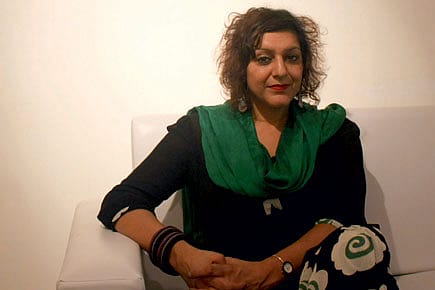The Pain and Pleasure of Playing an Older Woman

Meera Syal on why The Kumars at No 42 closed acting options for her in India
Even though it was British Asian comedienne Meera Syal's first visit to Mumbai in 10 years, she seemed quite at home. When we met her, she had just changed into a pair of flat chappals, bought from Colaba's street market, and was waving hellos during a lunch break before her talk about the need for British-Indian cinematic collaboration.
In person, Syal looks a fry cry from the Ammi character she played in the popular television show, The Kumars at No. 42. And the 50-year-old is in no mood to play mother to anyone ever again—let alone a grandmother. "The only reason I never acted in Indian movies was because I only got offered mother roles. In fact, the one movie I did do, I played mother to a person four years younger than me. I am one of those Asian women who don't start getting white hair at this age or massaging their knees saying 'aye hai'. We are still vital, still young. I have a young child and have no grandchildren."
It could be hard for Syal to find roles that suit her needs here. Even though the author, actor, writer and producer has excelled in all her endeavours. Be it playing the "I say anything and it's okay"ammi in The Kumars, or performing and writing Goodness Gracious Me, or writing Anita and Me and Bhaji on the Beach, and most recently taking part in the BBC Radio 4 programme My Teenage Diary, where she discussed growing up as the only British Asian girl in a small English town, feeling overweight and unattractive. She nods, "But now that I look back in time, being different helped me a lot. My creativity comes from being on the outside and seeing a bigger picture. My daughter is very different from me. She doesn't ask as many questions because her life is so different—attitudes to Indians are so different now." But she is surely not an 'outsider' anymore—she attended Prince Charles' wedding and was awarded the MBE in the New Year's Honours List of 1997. But Syal is quick to point out, "Yes, they have accepted me at some level, but the raw facts are that I will never have the same career as my White contemporaries. It just won't happen. And it may not change. Britain is quite conservative right now. They are clinging to tradition and it's about nostalgia, and watching television that reminds them of the good old days. Let's just say, I am not going to be in Downtown Abbey anytime soon."
Imran Khan: Pakistan’s Prisoner
27 Feb 2026 - Vol 04 | Issue 60
The descent and despair of Imran Khan
No wonder then that Syal feels that a British-Indian collaboration is the order of the money. As she puts it simply, "You have the money, we have the talent. We need to do something." After watching Delhi Belly, a movie that reminded her of Goodness Gracious Me with its irreverent comedy that cuts through barriers, Syal is insistent that a movie that questions the Caucasian identity could be what audiences are seeking. "Every time I come to India, I notice the growing confidence in people. There is a massive middle class population with spending power and you have to tap into that. They are not like their parents. They are doing what we did in Britain years ago as immigrants—they are deciding what they want to adapt from the culture and what they want to reject. And these are the people we need to target."
And then the actress, who is now writing her third book, smiles mischievously, "I would love to act in a movie in India soon. I have never set out to make a movie with an agenda, so I think a family movie would be fun. But if you really ask me, I would love to make a movie like The Graduate—an older Indian woman in love with a younger man. Don't you think that would say a lot about Indian society? Won't that be perfect?"
